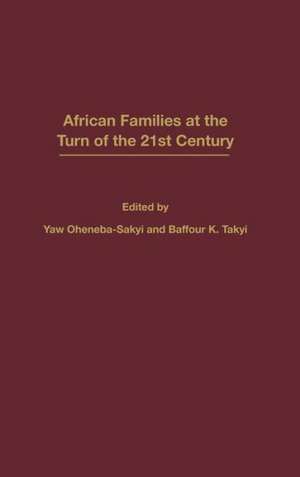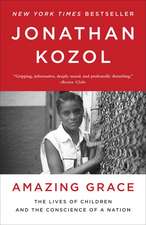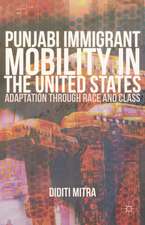African Families at the Turn of the 21st Century
Editat de Baffour K. Takyi, Yaw Oheneba-Sakyien Limba Engleză Hardback – 29 mar 2006 – vârsta până la 17 ani
Preț: 347.90 lei
Preț vechi: 477.81 lei
-27% Nou
Puncte Express: 522
Preț estimativ în valută:
66.59€ • 69.91$ • 55.01£
66.59€ • 69.91$ • 55.01£
Carte tipărită la comandă
Livrare economică 30 ianuarie-13 februarie 25
Preluare comenzi: 021 569.72.76
Specificații
ISBN-13: 9780275972745
ISBN-10: 0275972747
Pagini: 318
Dimensiuni: 156 x 235 x 29 mm
Greutate: 0.59 kg
Editura: Bloomsbury Publishing
Colecția Praeger
Locul publicării:New York, United States
ISBN-10: 0275972747
Pagini: 318
Dimensiuni: 156 x 235 x 29 mm
Greutate: 0.59 kg
Editura: Bloomsbury Publishing
Colecția Praeger
Locul publicării:New York, United States
Notă biografică
Yaw Oheneba-Sakyi is Professor and Head of the Africana and American Indian Studies Program at California State University, Fresno. The author of Female Autonomy: Family Decision Making and Demographic Behavior in Africa, he has also published several articles in respectable journals.Baffour K. Takyi is Associate Professor of Sociology at the University of Akron, Ohio. His varied research interests include reproductive related behavior, family dynamics, and African immigrants in the U.S. He has published extensively with some of his papers appearing in edited volumes on family and in journals such as Journal of Marriage and Family, Social Science and Medicine, Journal of Comparative Family, Journal of Family and Economic Issues, Sociological Focus, Family Perspectives, Sociology of Religion, African Journal of Reproductive Health, Ethnic and Racial Studies, and Western Journal of Black Studies.
Cuprins
PrefaceIntroduction to the Study of African Families: A Framework of Analysis by Yaw Oheneba-Sakyi and Baffour K. TakyiNorthern AfricaContinuity or Change: Family Law and Family Structure in Tunisia by Mounira M. Charrad and Allyson B. GoekenDiversity and Family: The Example of Egyptian Families by Bahira Sherif-TraskThe Sudanese Family: Past Reflections and Contemporary Realities by Carolyn Fluehr-LobbanWestern AfricaSenegalese Families: The Confluence of History, Ethnicity, and Social Change by Loretta Bass and Fatou SowStructural Change and Continuity in the Ivoirian Familiy by N'Dri T. Assie-LumumbaGender and the Family in Ghana: Past and Present Perspectives by Elizabeth Ardayfio-SchandorfThe Nigerian Family: Contrast, Convergence, Continuity, and Discontinuity by Obioma NnaemekaCentral AfricaReflections on the Changing Family System in Cameroon by Chuks J. Mba and Martin W. BanghaEastern AfricaKenyan Families by Miroslava PrazakSouthern AfricaSocial Change, Family Dynamics and Women's Empowerment in Malawi by Agnes M. ChimbiriFamily Life in South Africa: The Case of Soweto, Gauteng by Sylvia N. MoenoConclusionAfrican Families of the New Millennium: Concluding Remarks by Baffour K. Takyi and Yaw Oheneba-SakyiSubject IndexAppendices
Recenzii
Geography, area studies, sociology, anthropology, and history are among the disciplines represented by contributors either from or in Africa, or specializing and having worked there. They provide a historical context for understanding the many types of families in the continent, and show how family systems have changed in country-specific contexts and the consequences of these changes. To counter the prevalence of studies on English-speaking countries, they include countries from North Africa and Francophone Africa.











